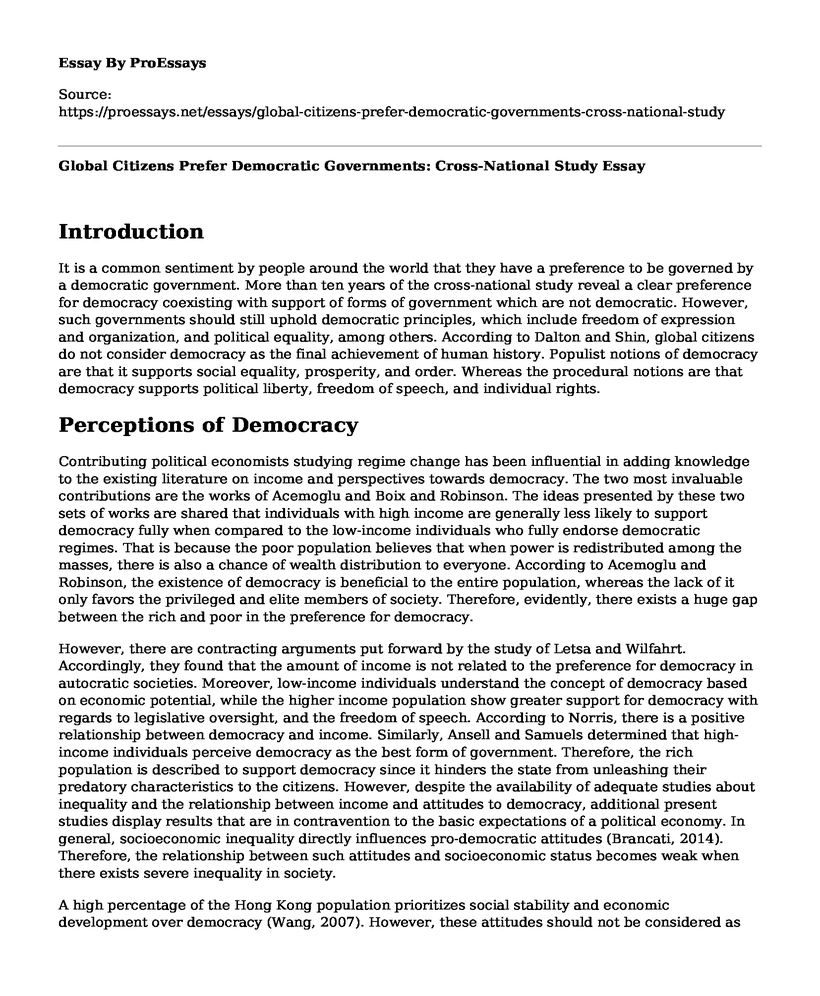Introduction
It is a common sentiment by people around the world that they have a preference to be governed by a democratic government. More than ten years of the cross-national study reveal a clear preference for democracy coexisting with support of forms of government which are not democratic. However, such governments should still uphold democratic principles, which include freedom of expression and organization, and political equality, among others. According to Dalton and Shin, global citizens do not consider democracy as the final achievement of human history. Populist notions of democracy are that it supports social equality, prosperity, and order. Whereas the procedural notions are that democracy supports political liberty, freedom of speech, and individual rights.
Perceptions of Democracy
Contributing political economists studying regime change has been influential in adding knowledge to the existing literature on income and perspectives towards democracy. The two most invaluable contributions are the works of Acemoglu and Boix and Robinson. The ideas presented by these two sets of works are shared that individuals with high income are generally less likely to support democracy fully when compared to the low-income individuals who fully endorse democratic regimes. That is because the poor population believes that when power is redistributed among the masses, there is also a chance of wealth distribution to everyone. According to Acemoglu and Robinson, the existence of democracy is beneficial to the entire population, whereas the lack of it only favors the privileged and elite members of society. Therefore, evidently, there exists a huge gap between the rich and poor in the preference for democracy.
However, there are contracting arguments put forward by the study of Letsa and Wilfahrt. Accordingly, they found that the amount of income is not related to the preference for democracy in autocratic societies. Moreover, low-income individuals understand the concept of democracy based on economic potential, while the higher income population show greater support for democracy with regards to legislative oversight, and the freedom of speech. According to Norris, there is a positive relationship between democracy and income. Similarly, Ansell and Samuels determined that high-income individuals perceive democracy as the best form of government. Therefore, the rich population is described to support democracy since it hinders the state from unleashing their predatory characteristics to the citizens. However, despite the availability of adequate studies about inequality and the relationship between income and attitudes to democracy, additional present studies display results that are in contravention to the basic expectations of a political economy. In general, socioeconomic inequality directly influences pro-democratic attitudes (Brancati, 2014). Therefore, the relationship between such attitudes and socioeconomic status becomes weak when there exists severe inequality in society.
A high percentage of the Hong Kong population prioritizes social stability and economic development over democracy (Wang, 2007). However, these attitudes should not be considered as anti-democracy. However, the worry among the general population is that changes in the state of government could have a devastating impact on the economic development of China. According to the theory of value change, a society enjoying economic affluence for a considerable period, the population tends to develop interests in political rights, through seeking democracy. Affluent individuals for a long period begin to become participative and assertive on their political rights by challenging the state government. Hence, the demand for democracy is based more on populations of high income due to long periods of economic prosperity.
References
Acemoglu, D., & Robinson, J. (2014). The Rise and Decline of General Laws of Capitalism. Retrieved 13 December 2019, from https://dx.doi.org/10.2139/ssrn.2537592
Ansell, B., & Samuels, D. (2014). Inequality and democratization. New York: Cambridge University Press.
Boix, C. (2013). Democracy and redistribution. Cambridge, UK: Cambridge University Press.
Brancati, D. (2014). The Determinants of US Public Opinion Towards Democracy Promotion. Retrieved 13 December 2019, from https://www.jstor.org/stable/43653351?seq=1
Dalton, R., & Shin. (2014). The Civic Culture Transformed. Cambridge: Cambridge University Press.
Letsa, N., & Wilfahrt, M. (2018). Popular Support for Democracy in Autocratic Regimes: A Micro-Level Analysis of Preferences. Comparative Politics, 50(2), 231-273. doi: 10.5129/001041518822263674
Norris, P. (2016). Democratic deficit. Cambridge [etc.]: Cambridge University Press.
Wang, Z. (2007). Public Support for Democracy in China. Retrieved 13 December 2019, from https://www.tandfonline.com/doi/pdf/10.1080/10670560701562283
Cite this page
Global Citizens Prefer Democratic Governments: Cross-National Study. (2023, Mar 20). Retrieved from https://proessays.net/essays/global-citizens-prefer-democratic-governments-cross-national-study
If you are the original author of this essay and no longer wish to have it published on the ProEssays website, please click below to request its removal:
- Movements by Native Americans Essay
- Culture, Equity, Power, and Influence in Education Essay
- Supporting Affordable Housing and Section 8 Vouchers Paper Example
- Essay Sample on 7 Key Aspects of Cultural Diversity: Respecting Differences, Empowerment & Max Potential
- Canadian Govt Leadership Competency Profiles: HR Needs & Prof'l Standards - Essay Sample
- Essay Example on Nuclear Weapons & the IAEA: The Additional Protocol
- Book Review Sample on US Regime Change: Examining Stephen Kinzer's 'Overthrow'







